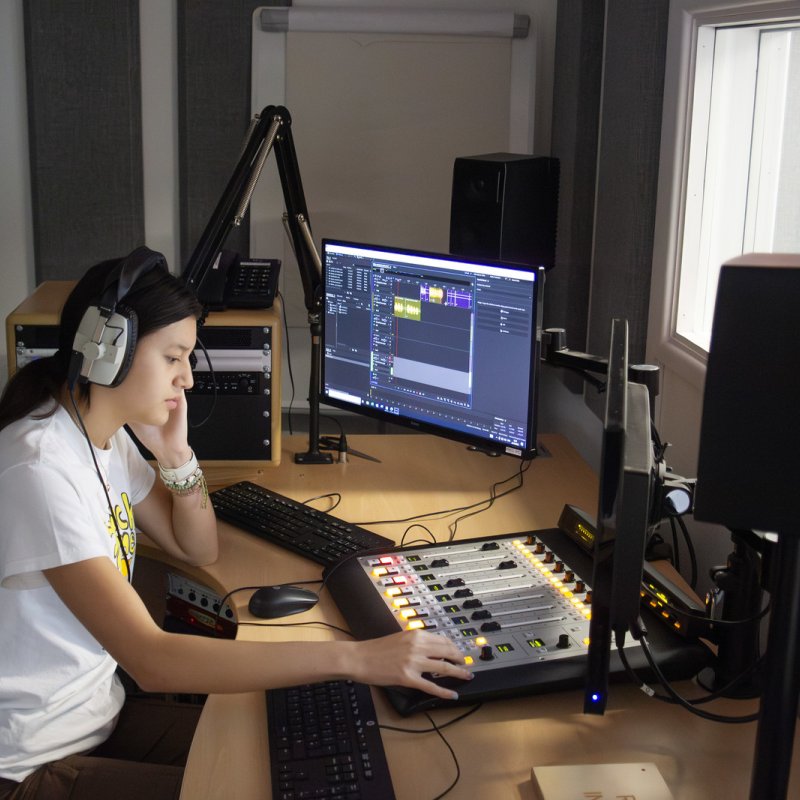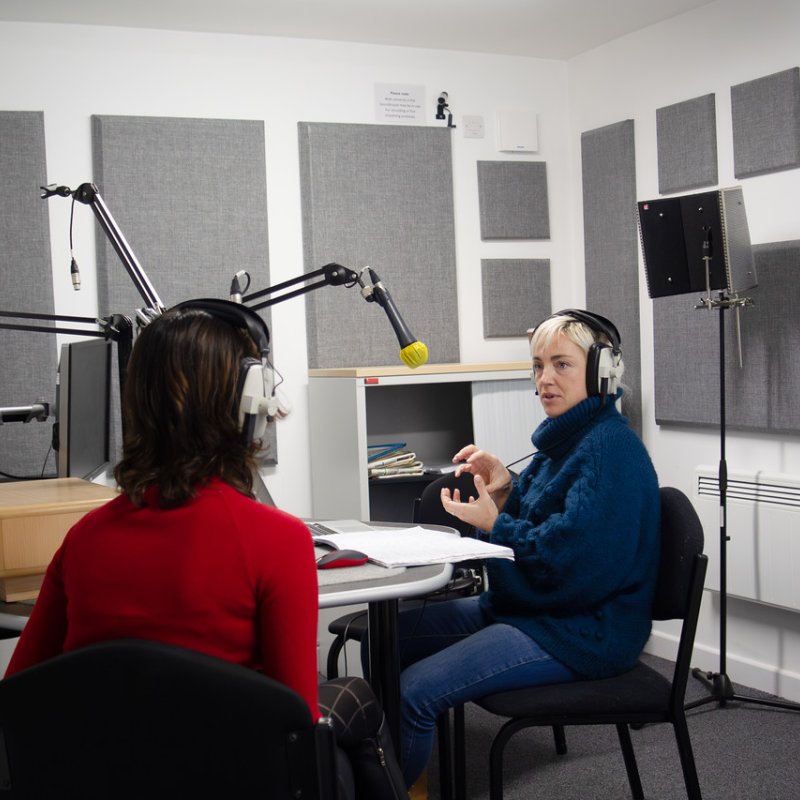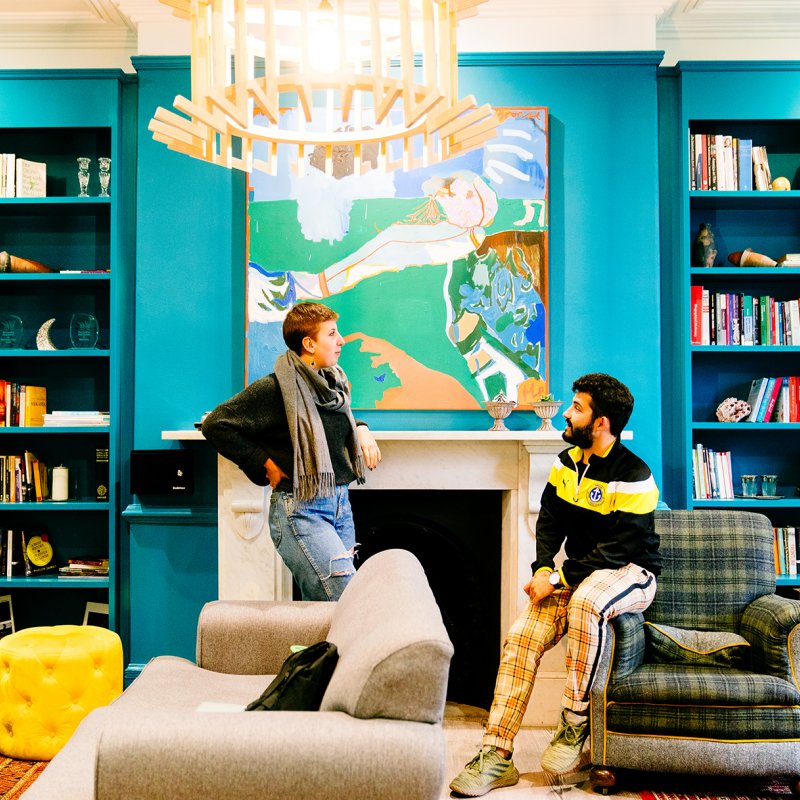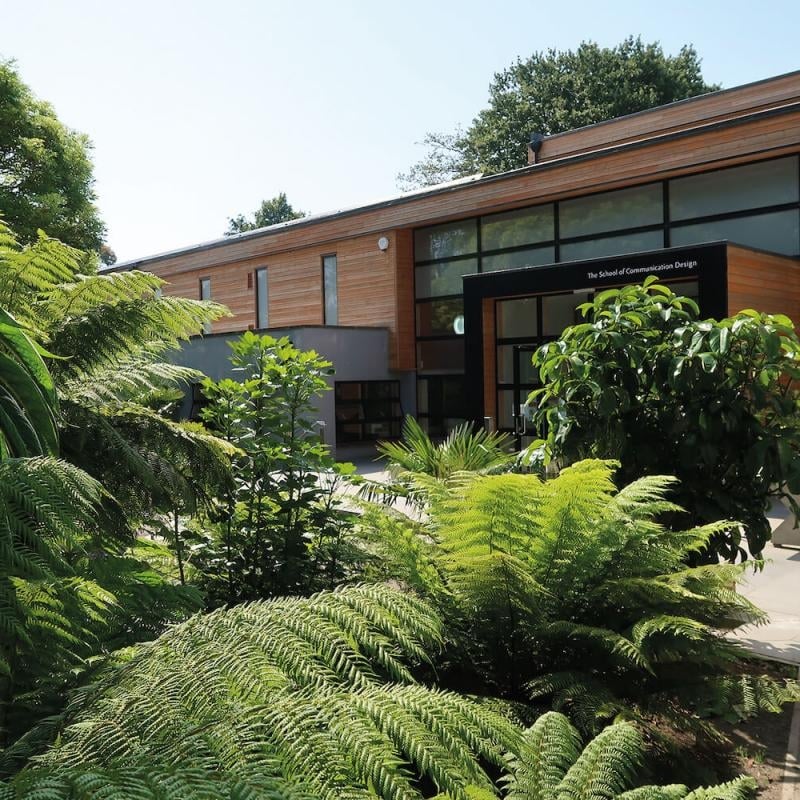
Media Production BA(Hons)
Become a multimedia storyteller across digital channels.
Course overview
Our content-hungry world calls for skilled storytellers who can work across multiple platforms, from film and television documentary to broadcast news, social media and immersive experience.
An exciting fusion of advertising, journalism and screen production, this course will equip you with a solid set of technical production tools and the flair to turn your creative vision into compelling content that sells. You’ll learn how to pitch, plan and deliver your ideas, graduating as a flexible communicator able to make, edit and produce.
You will:
- Develop in-demand making, editing and curating skills vital to the media and creative industries
- Learn to professionally pitch, plan and deliver content in response to project briefs individually and in collaboration with your peers
- Have the opportunity to work alongside industry partners on exciting briefs, or secure your own work placement
- Have access to professional-standard facilities across the School of Communication and the School of Film & Television, including specialist film and editing facilities, photography and video studios, post- production labs, newsrooms, radio studio and advertising studios
- Grow your understanding of audiences, market traction and the wider cultural, social and political implications of the global media industries
Course details
On this Media Production degree, you'll have the opportunity to gain a BA(Hons) degree over three years or the option to study Media Production BA(Hons) with Integrated Foundation Year and/or professional placement study options.
You'll gain the practical skills and strategic understanding to deliver commercial content that makes a splash. You'll develop the art of persuasion and the ability to pivot content to capitalise on market opportunities. With a practice-based approach to learning, the course will also help you develop transferrable project management and team-working skills, giving you the professional edge when you graduate.
You’ll start developing the skills you’ll need to succeed from the very beginning, as you immerse yourself in the contexts and practices of the current media production and content creation landscape. You’ll explore key concepts around visual and audio production, creative problem-solving and professional practice.
Modules
Creative Problem Solving
In this module, you’ll explore industry methods, tools and frameworks used in the creative process.
Discovery
You’ll discover the heart of storytelling through filmmaking. Learning fundamental production skills, you’ll look at how we might express original ideas visually and audibly.
Digital News Lab: Audiovisual Storytelling
In this module, you’ll explore mobile journalism and social media outputs. You'll develop skills in audio, video, still images and social networking, needed to work in the global digital news media environment.
Agency Life
This module will give you an overview of agency life, the roles and responsibilities common across agencies and the processes and ways of working you can expect upon graduating.
The Information Age: Exploring the Media Landscape
This module will support you to study and debate the key trends shaping the contemporary media landscape. Alongside this, you’ll get a working knowledge of key laws and regulations which journalists and communications professionals must work within.
Represent
In this module you’ll learn how to develop your ideas, find stories and characters, and decide what creative storytelling you’ll use to form a documentary. You’ll work within industry health and safety, editorial, and diversity guidelines to deal sensitively with your contributors and produce a quality piece of documentary work.
In year two, you’ll develop and hone your video creation, art direction and copywriting skills while learning the business of content creation web, social media and magazines too. You’ll hear from media professionals from around the globe and get to work alongside colleagues on live briefs.
Modules
Digital News Lab: Local is Global
Building on the skills from your first year, you’ll learn how to take your reporting practice into new areas. Focusing on a key current issue, you’ll work individually and collaboratively, putting your storytelling and editing skills to work.
Media Lab
You’ll consider a wide range of media channels and their role in delivering effective communications. You’ll examine the pros and cons of different channels and their relevance to varying audiences. This will allow you to develop effective media campaigns that deliver results.
Global Creators
This module is designed to bring a diverse range of voices and experiences from media practitioners working and creating across the world into the course, giving you a thorough understanding of the industry and employment pathways that are open to you as practitioners.
Making Magazines
Get the opportunity to work on an editorial team to conceive, plan and create a brand new magazine across print and digital mediums. You’ll write a business plan, considering commercial viability, and learn the processes involved in the production, launch and distribution of magazines.
Collaboration
In this module you’ll have the opportunity to work with fellow students to realise a creative media project of your own. You’ll apply your core professional skills including negotiation, problem-solving and project management, to initiate, create and deliver a unique project.
You can choose to take an optional professional placement after your second year on a three-year programme, or after your third year if you’re studying for a degree with an Integrated Foundation Year.
You’ll be responsible for finding your own placement, with support from the Employability team.
Choosing this option will enhance your industry experience and skills while studying.
How you’ll study during your professional placement
You’ll spend time working in a professional context, as part of a business or organisation. This can be in one role, or up to three, and must be for a minimum of 24 weeks.
You’ll develop in-demand workplace skills, deepen your insight into industry and grow your network of contacts, all of which could help you get ahead in your career after graduation.
Throughout this year, you’ll develop a portfolio of work that includes critical self-reflection on what has been learned from the experience. You’ll be required to evidence your experiences, the skills you’ve learned and your professional growth.
Your final year is all about creating a career-launching portfolio. You’ll work collaboratively and individually on a range of content outputs and contribute to a digital multimedia production project. You'll also sharpen your professional and business development skills, so you’re all set to start making a living from your practice.
Digital News Lab: Going Live
This module will solidify all you’ve learned during your degree as you work collaboratively in a deadline-driven newsroom. You’ll take responsibility for organisation and quality control and produce high quality digital news.
Final Year Project: Development
You’ll research, plan and develop a self-initiated final year project based on a brand or topic of your choice that reflects your creative passions or professional aspirations.
Final Year Project: Showcase
You will create a Final Year Project that will showcase your critical thinking and creative practice.
Students will have the opportunity of choosing between Final Portfolio and Mini-Documentary for their final module:
Final Portfolio
You'll work on industry-recognised competition briefs such as CIM Pitch, D&AD New Blood and Creative Conscience to develop a unique portfolio that showcases your knowledge and skills across the three-year degree.
Mini-Documentary
In this module you’ll use your planning, storytelling and craft skills to create an extended mini-documentary. Working independently, you’ll refine your idea, tailoring it to your audience, and pitching the concept to a panel following professional processes.
Why study an Integrated Foundation Year route?
If you’re taking on a new subject that you haven’t studied in depth before, have been out of education for a while or have a non-standard educational background then an Integrated Foundation Year degree may be the right choice for you. It is a four-year degree with an Integrated Foundation Year to start, which allows you to explore the primary elements of your subject before progressing on to the remaining three years of the BA(Hons) degree.
What you'll study in your Foundation year
If you choose this pathway, you'll study five core modules in your Foundation year. These are all designed to help you explore the foundational elements of your subject. You'll gain relevant technical skills, learn to experiment and take risks, develop an understanding of professional practice, have opportunities to work across disciplines and collaborate with other students on live project briefs.
Modules
Explore
You'll begin your foundation year by working collaboratively with others to explore themes of the future. You'll take risks, experiment through play and be supported to break through barriers.
Technique
You'll take subject-specific workshops and develop essential technical and practical skills in your area of study. You'll also enhance your analytical and organisational abilities.
Apply
You'll work with your peer group to think beyond discipline by addressing a societal or global issue. You'll then showcase your work to your peers and deliver an accompanying evaluation of your process.
Industry
You'll enhance your creative and practical skills in your subject specialism by responding to typical industry briefs, underpinned by focused research and experiments. You'll also gain industry insights through guest lectures and workshops.
Launch
You'll develop your unique identity in your specialism through the production of a self-initiated body of work. Your final project will be the bridge to your next year, fully supported by evaluative reviews and critical analysis of the work you have created.
After the Foundation year, you progress into Year One of the full three-year degree, equipped with a deeper knowledge of your subject, a clear understanding of your strengths, and develop a practical and technical skillset and the confidence to excel in your chosen subject.
If you apply for and enrol onto a degree with an Integrated Foundation Year, you’ll have the option to switch onto a five-year version including a placement year. That means you’ll complete the first three years of your course before completing a placement in industry in your fourth year and returning to Falmouth for the fifth year of your programme.
The Integrated Foundation Year pathway for this course is new for entry year 2023 and subject to validation.
As part of our process of continuous improvement, we routinely review course content to ensure that all our students benefit from a high-quality and rewarding academic experience. As such, there may be some changes made to your course which are not immediately reflected in the content displayed on our website. Any students affected will be informed of any changes made directly.
From module information to course aims and assessment criteria, discover the full course details:
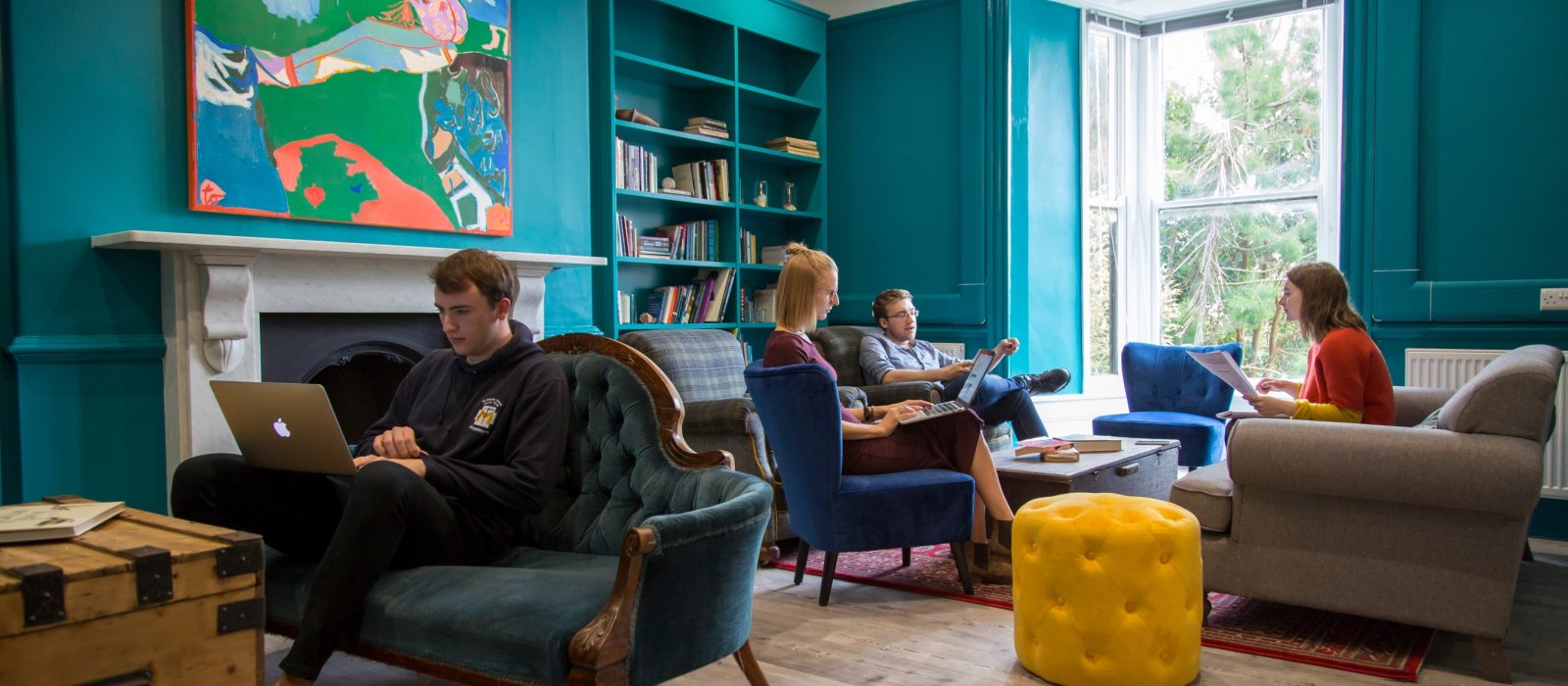
How you’ll learn & be assessed
Through skills development workshops, masterclasses and interactive seminars, supported by keynote lectures, you'll develop briefing, concepting, strategy, research, idea development and planning skills. Mirroring industry, you'll then put these skills into practice as you work on real-world projects individually and in teams. Throughout your Media Production degree, you'll benefit from the course team's film, television, advertising and journalism connections.
At Falmouth, we use a 'digitally enhanced learning & teaching' approach. Your experience will always be predominantly in-person, including seminars, tutorials and studio teaching, with some, more targeted elements, being online either live (synchronous) or pre-recorded (asynchronous). You can read more here.
100% of your assessment will be coursework. There are no exams as part of this course.
Assessment methods
Assessments can take many forms, including:
- Practical projects
- Presentations
- Portfolios
- Short essays
- Integrated Foundation Year assessments are 100% coursework based
Mirroring the industry, we encourage self-evaluation at the end of each project and support this via personal development plans.
Facilities
Media Production students will have access to professional facilities from across the School of Communication and the School of Film & Television. This includes:
- Dedicated studio space
- A well-equipped digital newsroom with news feed
- 25 workstations with professional scriptwriting and editing software
- The Soundhouse, our dedicated radio studio and podcast facility
- A wide range of DV cameras and audio recording devices
- Use of the School of Communication's dedicated study and meeting space, The Lighthouse
- Digital labs, lecture theatres and seminar rooms
- Library housing 140,000 books, 17,000 DVDs/videos and over 400 journal titles
- Four large production studios, including specialist green screen studio with access to motion capture kit and VR/AR/MR equipment
- Nine Mac Pro edit suites with Avid Media Composer, Adobe Creative Cloud Suite & Da Vinci Resolve.
- Two specialist grading suites featuring DaVinci Resolve and 4K preview screens.
- Two 28-seat 'Post Hubs' for post-production software training
- Three further post-production audio suites – all equipped with Pro Tools Ultimate.
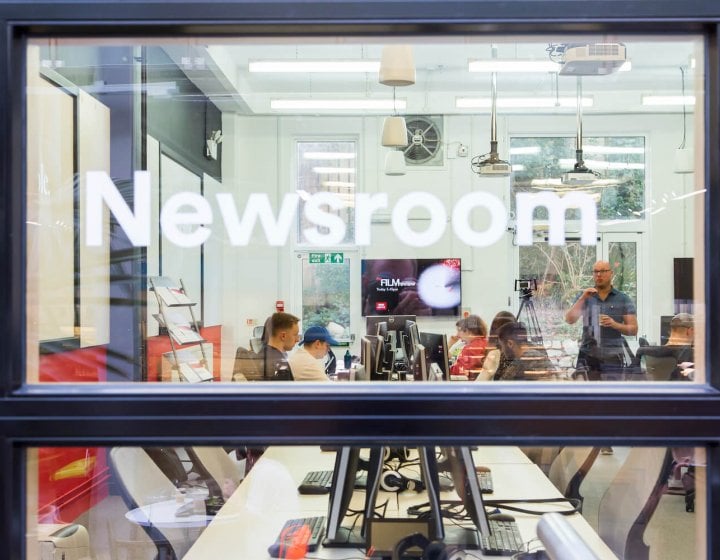
Media Equipment and Facilities
Our industry-level facilities offer everything you need to practice and produce animation, film, TV,...
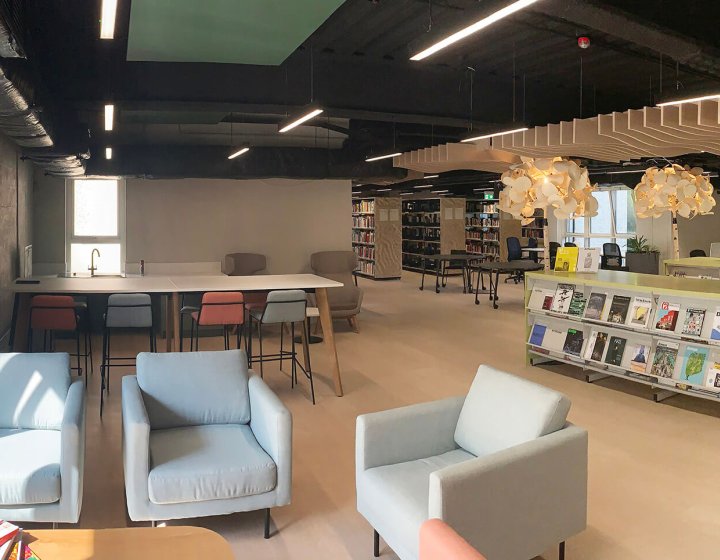
Library Facilities
Offering extensive collections, our two libraries provide a wealth of digital resources, magazines, ...

Sports Centre
Our Sports Centre, on Penryn Campus, includes a spacious gym with up to 90 of the latest, new statio...
Stories from our community
Explore student projects, graduate successes, staff news and industry insights

Embarking on a new academic adventure as a mature student
22 April 2025
Hello curious readers and future students! As a mature student stepping back into the academic world...
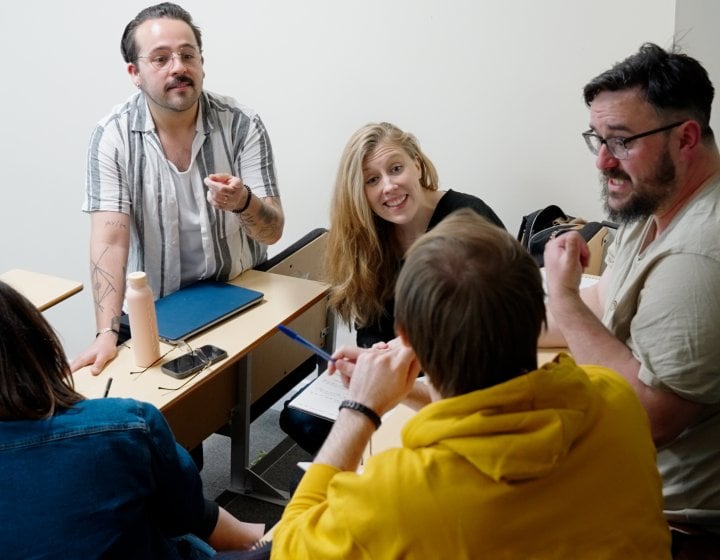
Meet our online Screenwriters
17 April 2025
Falmouth's established Writing for Script & Screen MA (Online) course has garnered a passionate and ...
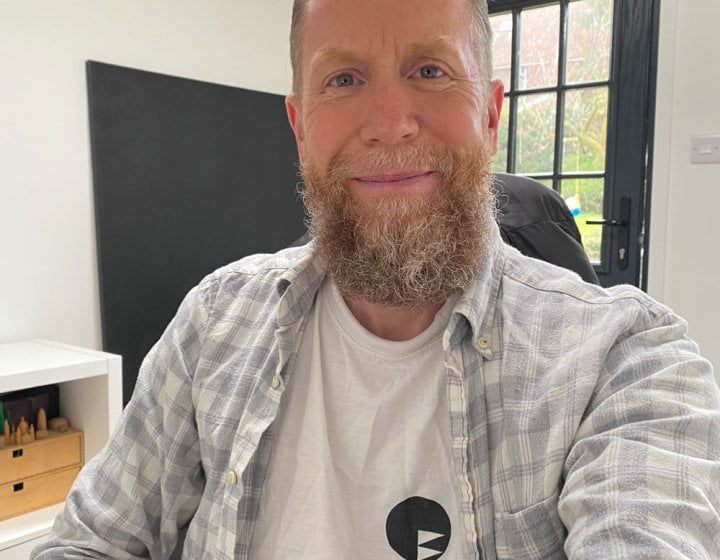
Simeon Berends on a career shaped by curiosity
01 April 2025
When Simeon Berends walked through the doors of a local radio station as a teenager, he was hoping f...

“Have a strong idea at the heart of every creative project,” says James Flint
25 March 2025
After graduating from the Graphic Design BA(Hons) in 2012, James Flint got a lucky break as an inter...

Illustration graduate redraws future in games industry
14 March 2025
Originally enrolled in Falmouth’s Illustration BA(Hons) course, Thomas soon realised that his pass...

Exploring the Future of Gaming with Ryan Norrington
14 March 2025
We’re excited to welcome Ryan Norrington, Creative Director at Metavision, as a guest speaker for ...
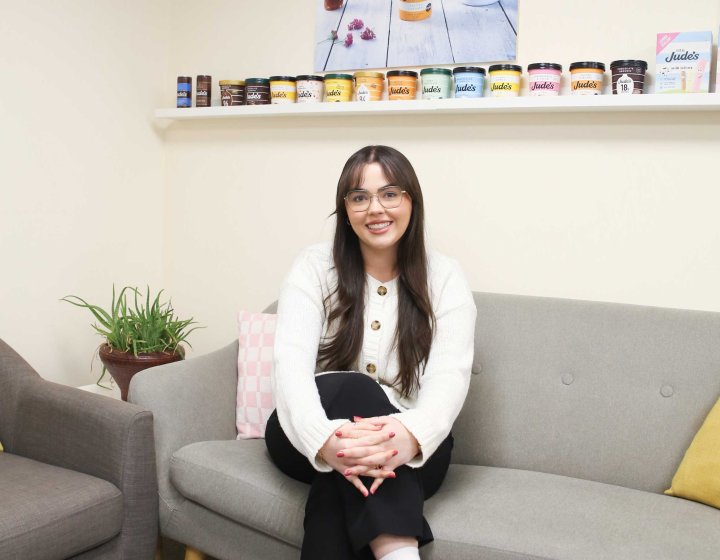
Graduate Spotlight: Charly Richards, Associate Brand Manager at Jude’s Ice Cream
24 February 2025
For Marketing and Digital Communications MA (Online) graduate Charly Richards, her dedication to lea...

Prussia Cove inspires Falmouth students on weekend writing retreat
17 February 2025
Third-year students on Falmouth’s undergraduate writing and journalism courses recently gathered a...
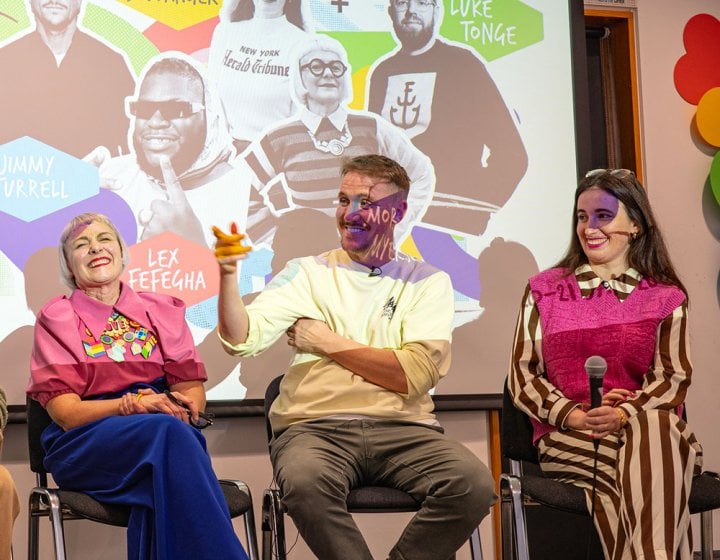
Design advice from five sector-leading creatives
13 February 2025
Students from across our Graphic Design BA(Hons) community recently had the chance to hear the uniqu...

Q&A with Graphic Designer, George Sutton
12 February 2025
George Sutton is a practicing designer - and alumni of Graphic Design BA - with an eye for cross-sec...

‘Design is Play’ Symposium: A Look into our Collaborative Graphic Design Event
10 February 2025
A group of innovative and engaging graphic designers came to Falmouth this January as part of an ins...

Falmouth lecturer publishes new poetry book
07 February 2025
In Damage Limitation, a poetry book in the form of a zine, published by zimZalla, Senior Lecture...
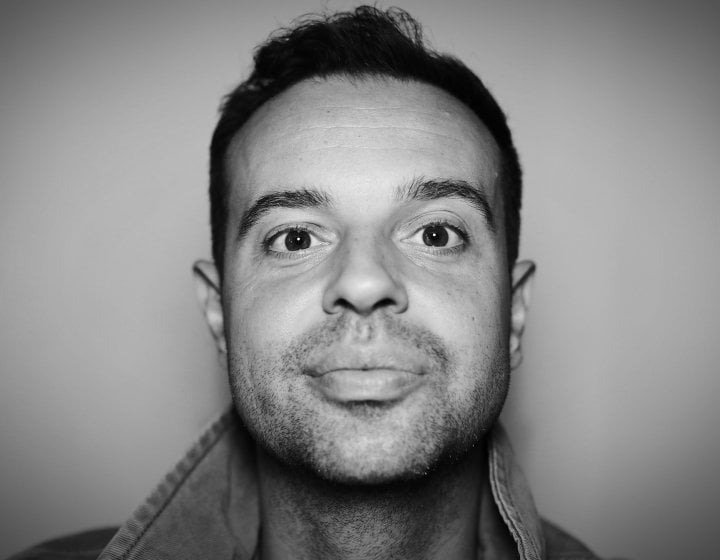
Screenwriting graduate’s short film ‘Going’ makes waves at UK film festivals
29 January 2025
Screenwriter and script consultant Brad Brookes has received numerous accolades for his work since g...

How to get the most out of Screenwriting Competitions
23 January 2025
For many screenwriters, completing a script is a significant milestone - and rightly so. But once th...
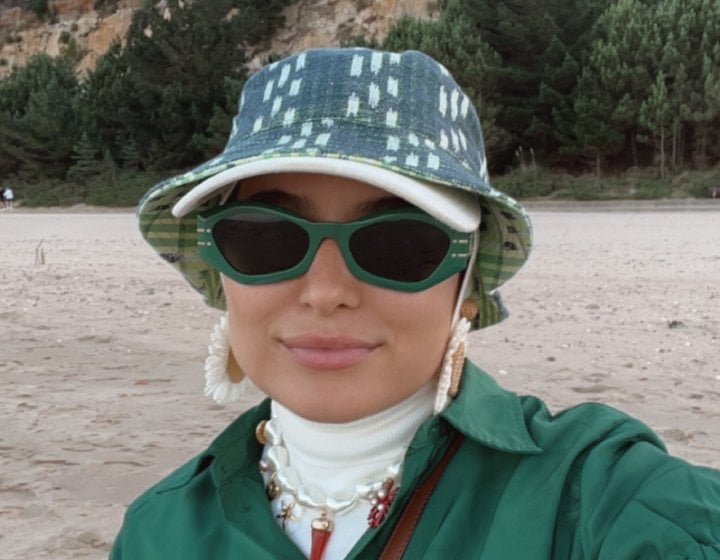
Why I chose to study Graphic Design online
21 January 2025
We chatted to Graphic Design MA (Online) student Dalal Elsamannoudi about her interest in design, he...

Graduate Anouska Sears: “Design truly has no limits”
06 January 2025
After working and gaining experience at various creative agencies, graduate Anouska decided to switc...

Journalism graduate’s cancer documentary wins short film award at Cannes
17 December 2024
Journalism and Creative Writing BA graduate Tavie Carey’s compelling documentary won the best shor...

Award-winning graduate secures Dreamtime Fellowship at Spike Island
12 December 2024
Communication Design MA graduate Alexis Over-Papatzaneteas has built on his hugely successful D&AD P...

Simon Nicholls and Bridget Christie. Credit: Rachel Riley Photography.
Falmouth comedy writers enjoy masterclasses from the best in the business
12 December 2024
Students and graduates from Falmouth’s online master’s in Comedy Writing met up in London last m...
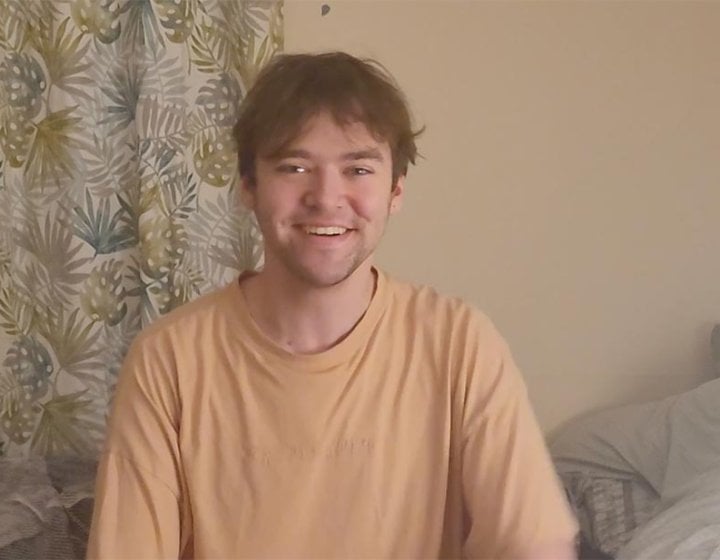
A day in the life of a Graphic Design student
10 December 2024
Follow a typical day of Graphic Design student, Matt.
Staff
You'll learn from practicing filmmakers, journalists, copywriters, marketers and advertising professionals with a wealth of knowledge, experiences and industry contacts between them.
Some members of staff only teach on specific modules, and your course might not feature every staff member who teaches on the course.

Lucy Cokes
Senior Lecturer, Creative Advertising
Lucy is a Senior Lecturer at Falmouth University, School of Communications. She has been working in ...
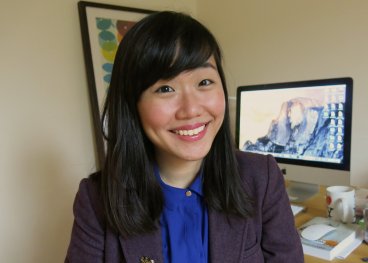
Dr Cui Su
Head of Advertising
After her boss at Young & Rubicam told her 'you're the best account handler I've ever had but go...

Dr James Branch
Senior Lecturer, Design Strategy
James is a lecturer and researcher specialising in design education. He holds a doctorate from Lough...
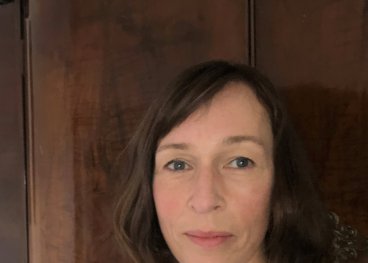
Dr Abigail Wincott
Associate Professor of Audio Journalism
Abigail Wincott is Leverhulme International Fellow at l'Université Paul-Valéry Montpellier, workin...
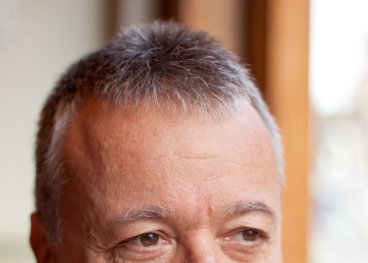
Kevin Bishop
Lecturer, Multimedia Journalism
Kevin Bishop is an broadcast news producer with over 30 years experience in newsgathering. Beginning...

Andy Chatfield
Senior Lecturer in Journalism
Andy studied History at Cambridge University before training as a journalist. He is a former deputy ...
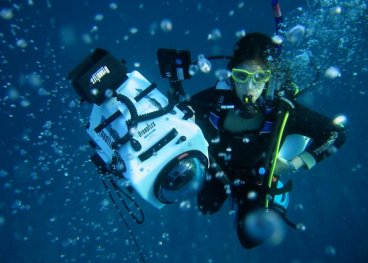
Faye
Course Leader, BA Television and Film Production
Faye is the Television and Film Production Course Leader at the School of Film & Television, hav...
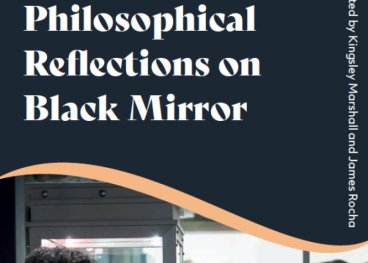
Dr Kingsley Marshall
Head of Film & Television
Dr Kingsley Marshall is Head of the CILECT and ScreenSkills accredited School of Film and Television...

Got a question about this course?
If you want to know more about the course structure, our application requirements or what our graduates have gone on to achieve, our friendly course team is here to help.
Chat to JamesCareers
Media Production graduates could go on to work across a range of sectors in a variety of roles, including:
- Analyst
- Media planner
- Marketing and content strategist
- Public relations executive
- Social media producer
- Digital content creator
- Documentary maker
- Journalist
- Copywriter
- Strategic planner
- Accounts executive
- Assistant producer
- Production coordinator
- Production assistant
- Project manager
- Videographer/camera operator
- Podcast producer
- Broadcast/digital reporter or editor
- Media planner
Studying a degree in English, Creative Writing or Journalism is more than just crafting the perfect poem or headline; it teaches you to see the world differently.
What can you do with an English, Creative Writing or Journalism degree?
How to apply
Ready to apply for 2025?
You can apply for our undergraduate degrees via UCAS. You'll need our university UCAS code (F33) as well as your course code (which you'll find on your course page) for your application.
| Course route | UCAS code |
|---|---|
| Media Production BA(Hons) three year degree | P31A |
| Media Production BA(Hons) with Integrated Foundation Year | FY36 |
| Media Production BA(Hons) with professional placement | PY51 |

Application advice & interview information
Go to ToolkitFor starting your studies in 2025
UK applications: 29 January 2025 (for equal consideration)
Applications after the 29 January will be considered on a first-come, first-served as long as there are places available. Apply for this course now.
International fee payers
International fee payers can apply throughout the year. But we recommend applying as early as possible, to make time for visa and travel arrangements.
We consider all applications on their own individual merit and potential. We invite all applicants to an interview day or audition to give them the opportunity to demonstrate this along with what inspires and motivates them in their field. Applicants will also be able to show their portfolio or give a performance depending on the course. We welcome applications from all subject backgrounds, whether you’ve specialised in STEM, the arts or humanities.
Course routes & entry requirements
BA/BSc(Hons) three year degree: 104 – 120 UCAS Tariff points
BA/BSc(Hons) four year degree with professional placement: 104 – 120 UCAS Tariff points
BA/BSc(Hons) four year degree with Integrated Foundation Year: 80 – 120 UCAS Tariff points
Check the title of your course to see if it's a BA or BSc award. UCAS Tariff points will primarily be from Level 3 qualifications such as but not limited to A-levels, T Levels, a BTEC/UAL Extended Diploma or a Foundation Diploma.
For applicants whose first language is English we require you to have or be working towards GCSE English Language Grade 4 (C), or equivalent.
If English is not your first language you will need to meet the same standard which is equivalent to the IELTS Academic 6.0 overall score, with at least 5.5 in Reading, Writing, Speaking and Listening. We accept a range of in country equivalencies and approved tests.
If you need a student visa to study in the UK, you may need to take a recognised language test. You can read our English Language Requirements for more information.
What we're looking for
Media-savvy students who love to tell stories and be creative, with an ambition to produce content for commercial or editorial purposes that really makes a splash.
Fees, costs & funding
Tuition fees
| Annual tuition fee | Student |
|---|---|
| £9,535 per year | Full-time UK |
| £17,950 per year | Full-time EU/international |
| £1,905 per professional placement year | Full-time UK and EU/international |
| £9,535 per Integrated Foundation Year | Full-time UK |
| £17,950 per Integrated Foundation Year | Full-time EU/international |
| Annual tuition fee | Student |
|---|---|
| £9,250 per year | Full-time UK |
| £17,950 per year | Full-time EU/international |
| £1,850 per professional placement year | Full-time UK and EU/international |
| £9,250 per Integrated Foundation Year | Full-time UK |
| £17,950 per Integrated Foundation Year | Full-time EU/international |
Tuition fees for September 2026 will be confirmed in summer 2025.
Tuition fees are set annually and are subject to review each year. The University may therefore raise tuition fees in the second or subsequent years of a course, in line with inflation and/or the maximum permitted by law or Government policy. Students will be notified of any changes as soon as possible.
The figures above don't include accommodation and living costs
Typical course costs
- £800 – Optional study visits and placements for the course duration
- £100-250 – Recurring annual costs (books, materials, portfolios, printing costs etc)
- Adobe Creative Cloud - You will need access to Adobe Creative Cloud. You may be eligible for discounted licenses through Adobe's education pricing and Falmouth University seeks to provide further discounts when possible. If any discounts are available, we will communicate these to you. For more information please visit Adobe Creative Cloud.
- £100 – external hard drive
- Laptop/desktop computer
- Smartphone
If you need to bring equipment or materials with you, these will be outlined in your Welcome Letter.
Additional typical course costs for Integrated Foundation Year pathway
- £250 for materials
- A laptop/desktop computer
- Adobe Creative Suite
To engage in the digital learning activity, although you will be able to access IT suites on campus, you will benefit from a laptop to access the platforms and tools we use. Depending on your subject, you may need a specific type of computer. If you're unsure about what you might need, please contact our course advisors.
Funding
For information about funding available, please visit our student funding pages.
Ask a student
What better way to find out about life at Falmouth University than by asking our current students?
From course details and academic support, to the social scene and settling in, our students are ready and available to answer any questions you might have. Simply set up your account, send them a question and they'll get back to you within 24 hours.
Similar courses

Business & Marketing BSc(Hons) (Online)
Become a skilled, confident, ethical and future-ready business and marketing professional with this ...
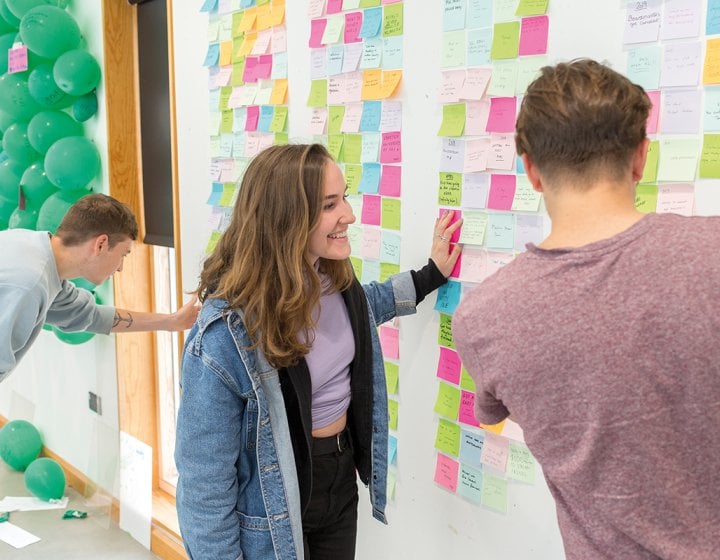
Marketing Communications BA(Hons)
In a world where technology is transforming how we live, work and play, marketers must be fast, flex...

Work by Hannah Mittelstaedt
Commercial Photography BA(Hons)
From creating photographs and films for high-end advertising and marketing campaigns to producing vi...
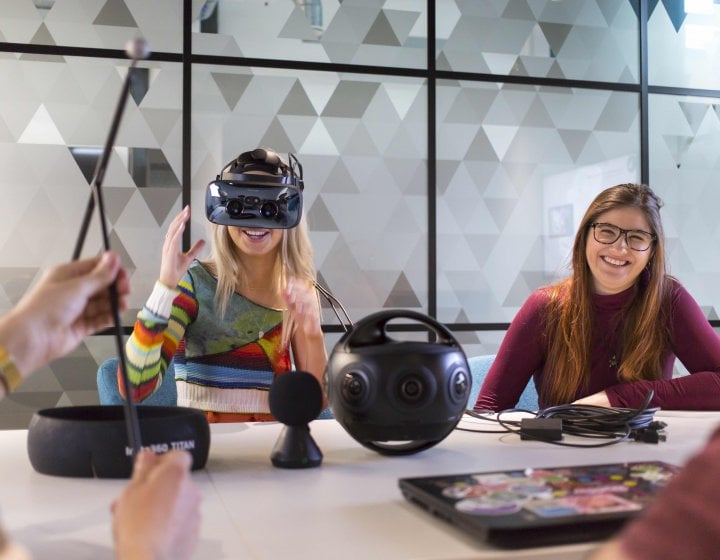
Business & Digital Marketing BSc(Hons)
Prepare yourself for a career in the fast-paced and ever-evolving world of business and digital mark...

Fashion Marketing BA(Hons)
Blend your flair for communication and eye for fashion into a successful career as a fashion markete...
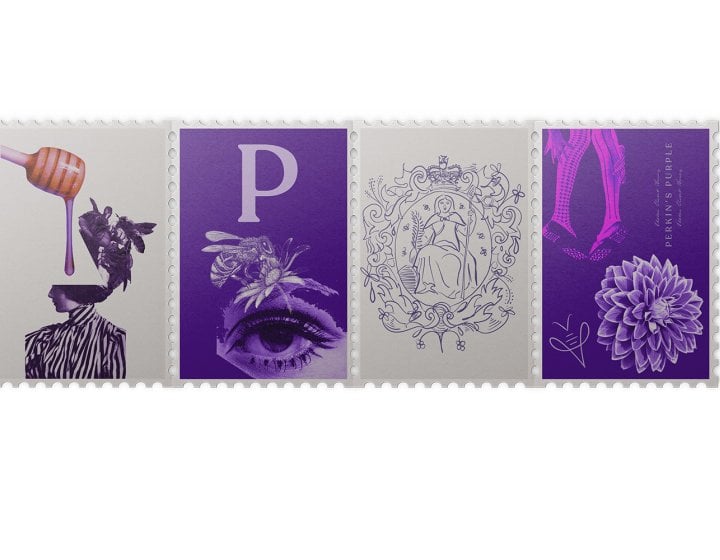
Graphic Design BA(Hons)
Graphic Design is one of the most versatile visual disciplines, embracing words and pictures, form a...
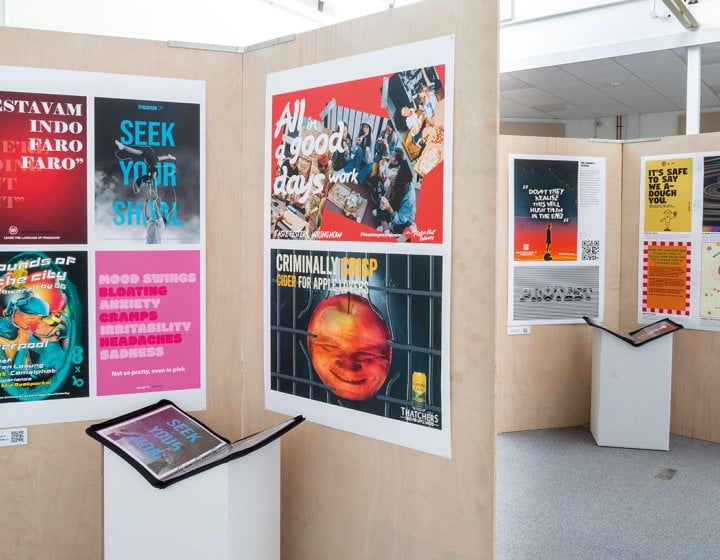
Creative Advertising BA(Hons)
Turn your ideas into powerful advertising campaigns with impact.
Open Days and events
From visiting campus to online application advice, get all the information you need about joining our creative community.
Find an event
